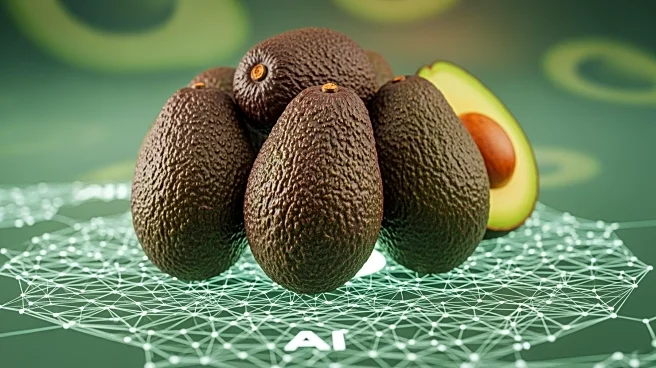What's Happening?
Researchers at Oregon State University and Florida State University have developed a smartphone-powered AI that can accurately predict the ripeness of avocados. Using over 1,400 iPhone photos of Hass avocados,
the AI model analyzes texture, color, and shape to determine firmness, achieving over 90% accuracy. This innovation addresses the issue of avocado wastage due to overripeness, which is a significant contributor to global food waste. The AI tool aims to help consumers and retailers make informed decisions about when to use or sell avocados, potentially reducing waste.
Why It's Important?
Food waste is a critical global issue, with nearly a third of all food produced going uneaten. The development of AI technology to predict avocado ripeness represents a significant step towards reducing this waste. By providing consumers and retailers with accurate information on fruit ripeness, the AI tool can help minimize the number of avocados discarded due to overripeness. This innovation aligns with federal goals to halve food waste by 2030, offering a practical solution that could be expanded to other produce. The technology has the potential to improve supply chain efficiency and consumer satisfaction.
What's Next?
While the AI tool for predicting avocado ripeness is not yet available to consumers, its development suggests future applications in the food industry. Researchers may explore expanding the technology to other fruits and vegetables, enhancing its utility in reducing food waste. As the tool becomes more widely adopted, it could influence purchasing and consumption habits, encouraging more sustainable practices. The success of this AI model may inspire further research and investment in technology-driven solutions to address food waste and improve food system efficiency.
Beyond the Headlines
The use of AI to predict fruit ripeness highlights the growing role of technology in addressing environmental and sustainability challenges. This development may prompt discussions on the ethical implications of AI in food systems, including data privacy and the impact on traditional agricultural practices. Additionally, the technology could influence cultural attitudes towards food consumption, promoting greater awareness of food waste and encouraging more responsible consumer behavior. As AI continues to evolve, its applications in the food industry may expand, offering new opportunities for innovation and sustainability.









